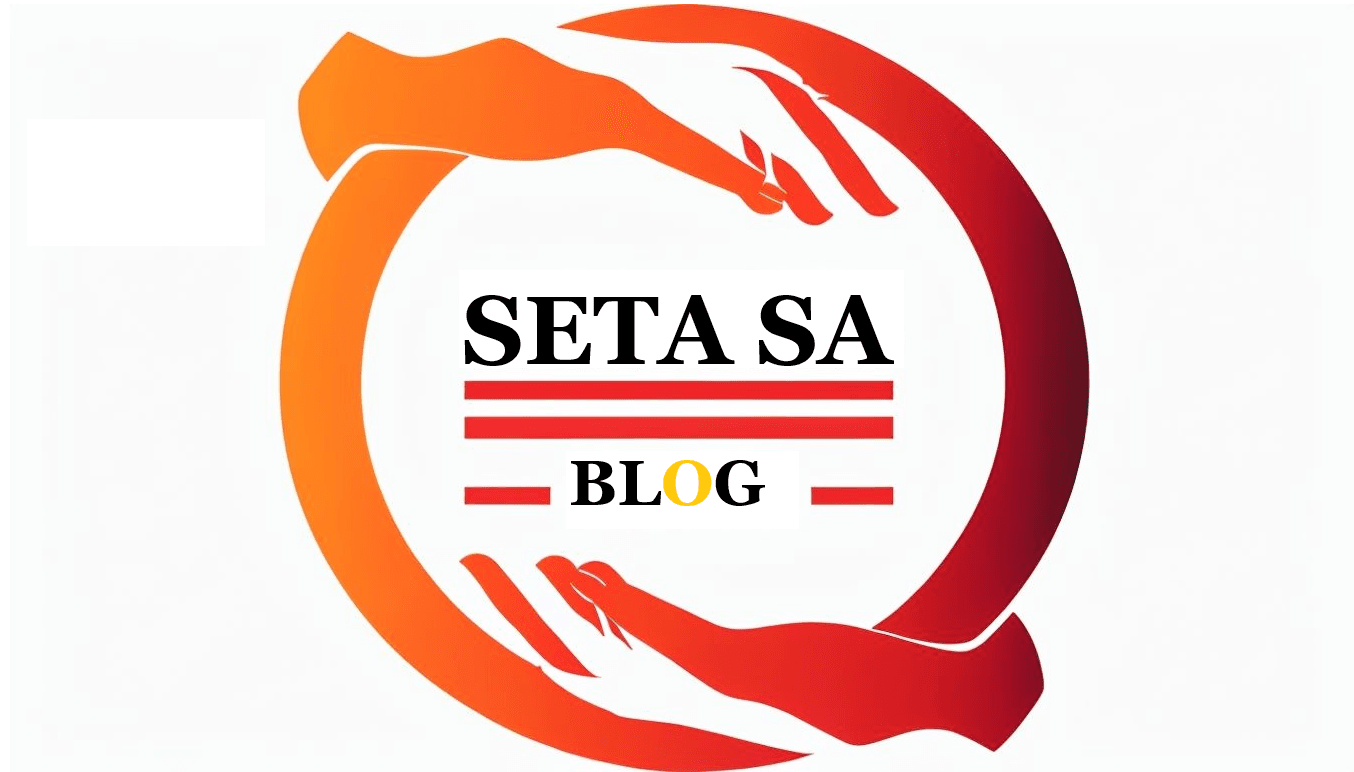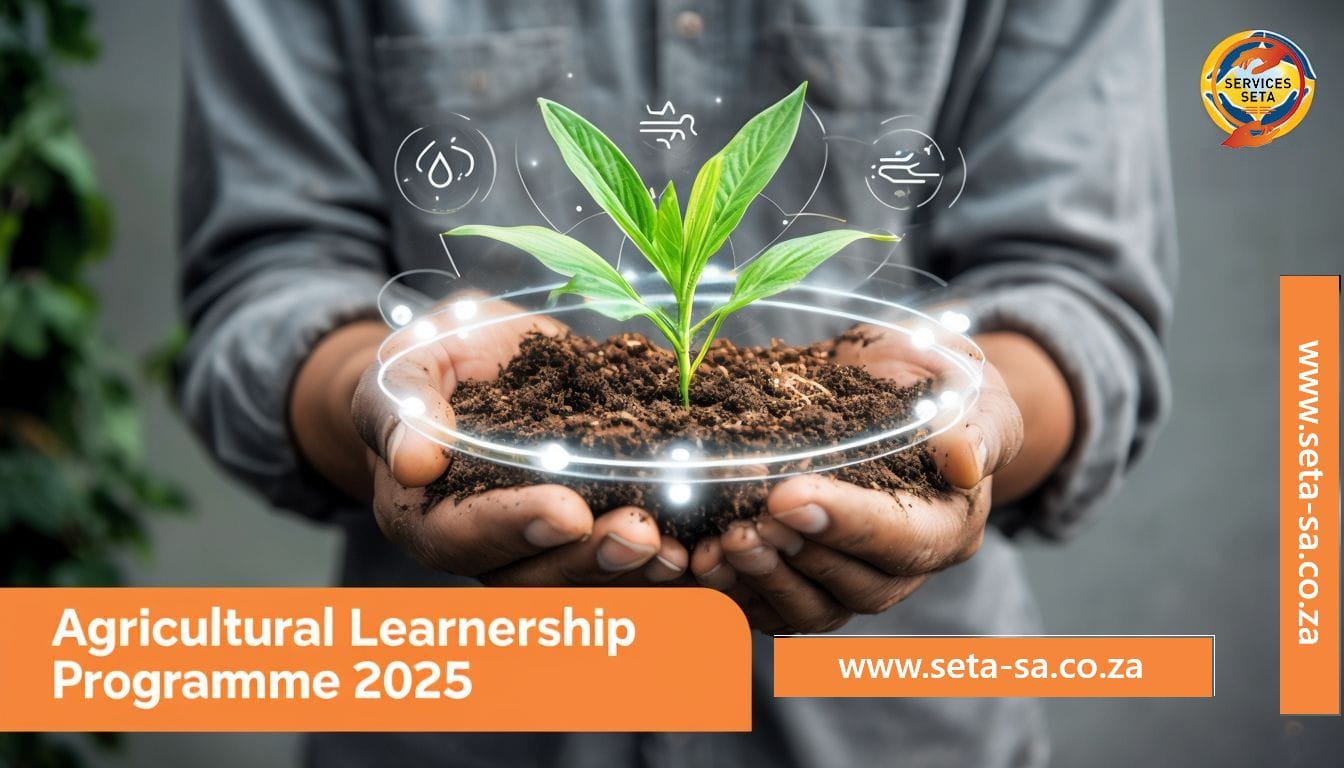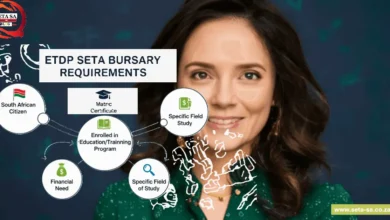SETA-Accredited Agricultural Learnership Programmes 2025 in South Africa
Imagine getting paid R2,500 every month to learn skills that could make you South Africa’s next agricultural entrepreneur – all while working on actual farms with cutting-edge technology. Sounds too good to be true? It’s not. Last month alone, over 3,000 young South Africans started their journey through AgriSETA learnership programmes, and many are already on track to earn R15,000+ within two years.
As someone who has guided over 200 learners through the agricultural sector since 2018, I’ve witnessed ordinary school leavers transform into farm managers, greenhouse specialists, and successful agribusiness owners. The secret isn’t luck or connections – it’s knowing exactly how to navigate the AgriSETA system and position yourself for the opportunities that matter.
Why Agricultural Learnerships Are South Africa’s Best-Kept Career Secret
While everyone chases office jobs and IT careers, agriculture quietly offers some of the most stable, well-paying opportunities in the country. The agricultural sector employs over 850,000 people directly, with another 2.5 million dependent on agri-related industries. Yet most young people overlook these programmes because they don’t understand what modern agriculture really involves.
Today’s agricultural careers aren’t about manual labor in dusty fields. You’ll work with:
- GPS-guided tractors and precision farming technology
- Hydroponic systems that grow crops without soil
- Drone technology for crop monitoring and pest control
- Automated irrigation systems controlled by smartphones
- Laboratory-quality testing equipment for soil and plant analysis
The agricultural sector has digitized faster than most industries, creating a massive skills gap that learnership programmes are specifically designed to fill.
Breaking Down AgriSETA’s 2025 Learnership Landscape
The Agricultural Sector Education and Training Authority operates differently from other SETAs. While most focus on urban-based training, AgriSETA embeds learners directly into working farms, research facilities, and agribusiness operations across rural and peri-urban areas.
What makes AgriSETA learnerships unique:
Real revenue generation: Unlike classroom-based programmes, you contribute to actual farm operations from day one, often helping generate the income that funds your training.
Technology integration: Every programme includes digital literacy components because modern farming relies heavily on data analysis, GPS systems, and automated equipment.
Entrepreneurship focus: AgriSETA actively encourages learners to develop business plans during training, with many receiving startup support upon graduation.
Geographic flexibility: Programmes operate across all nine provinces, with rural placements often offering accommodation support.
The Hidden Eligibility Requirements No One Talks About
The official requirements seem straightforward, but having reviewed hundreds of applications, I know what really determines acceptance.
Standard requirements everyone mentions:
- South African citizenship with valid ID
- Age range 18-35 years (some programmes extend to 40)
- Minimum Grade 9 education (varies by NQF level)
- Unemployed status or seeking career change
- Willingness to work in agricultural environments
What application reviewers actually prioritize:
- Rural background or family farming connections (even small-scale gardening counts)
- Physical fitness and outdoor work tolerance (assessed during interviews)
- Basic numeracy skills (essential for feed calculations, chemical mixing, yield measurements)
- Reliable transport or willingness to relocate (critical for farm-based placements)
- Communication skills in local languages (farms serve diverse communities)
The secret advantage most applicants miss: Demonstrating genuine interest in food security and sustainability issues. Mention specific agricultural challenges you’ve observed in your community during interviews.
Your Complete Application Strategy for 2025 Success
After helping hundreds of learners navigate this process, I’ve identified the exact approach that maximizes acceptance rates.
Phase 1: Strategic Programme Selection (January-February 2025)
Research timing matters: Applications typically open in January, but the best programmes fill quickly. Start monitoring AgriSETA announcements from December 2024.
Choose programmes based on local industry strengths:
- Western Cape: Wine production, fruit farming, aquaculture
- KwaZulu-Natal: Sugarcane, dairy farming, poultry production
- Gauteng: Hydroponics, urban farming, agri-logistics
- Free State: Grain production, beef farming, agricultural mechanics
- Limpopo: Subtropical fruits, vegetable production, livestock
Phase 2: Document Preparation Excellence (February 2025)
Essential documents (certified within 3 months):
- South African ID copy
- Highest educational certificate (Grade 9 minimum)
- Comprehensive CV highlighting any agricultural exposure
- Proof of residence (municipal account preferred)
- Medical certificate (required for some programmes)
- Unemployment affidavit (if applicable)
Pro tip: Include photos of any gardening, livestock care, or agricultural activities you’ve been involved with. Visual evidence of agricultural interest significantly strengthens applications.
Phase 3: Interview Preparation That Works
Technical knowledge they test:
- Basic plant biology (photosynthesis, plant nutrition)
- Simple animal husbandry principles (feeding, breeding cycles)
- Environmental awareness (water conservation, soil health)
- Business basics (profit/loss, customer service)
Practical assessments to expect:
- Identifying common crops and weeds from photos
- Basic measurements and calculations
- Problem-solving scenarios (sick animals, pest infestations)
- Communication role-plays with farmers and customers
The Real Financial Picture: What You’ll Actually Earn
Stipend amounts vary significantly based on programme level, location, and additional support provided.
2025 Stipend Structure:
NQF Level 1 (Basic Agricultural Assistant): R1,500-R2,000 monthly NQF Level 2 (Crop Production Specialist): R2,000-R2,500 monthly
NQF Level 3 (Farm Supervisor): R2,500-R3,200 monthly NQF Level 4 (Agricultural Technician): R3,000-R4,000 monthly
Additional support you receive:
- Safety equipment and work clothing
- Transport allowances (up to R500 monthly)
- Accommodation support for rural placements
- Meals during training periods
- Tools and equipment for practical training
- Certification and assessment fees
What the numbers don’t show: Many learners supplement their stipends through weekend work, small-scale farming projects, or part-time agricultural services. The networks you build during training often lead to additional income opportunities.
The Seven Most Valuable Agricultural Learnership Programmes for 2025
Based on employment rates, salary progression, and entrepreneurship opportunities, these programmes offer the best long-term prospects:
1. Precision Agriculture Technology
Focus: GPS systems, drone operations, data analysis Post-training earning potential: R18,000-R35,000 monthly Why it matters: Every commercial farm needs precision agriculture specialists as technology adoption accelerates.
2. Sustainable Horticulture Production
Focus: Greenhouse management, organic farming, water-efficient systems Entrepreneurship potential: Start with R50,000 investment Market demand: Organic produce commands 40% price premiums
3. Livestock Production and Management
Focus: Breeding programs, nutrition planning, health monitoring Career progression: Farm manager within 3-5 years Stability factor: Protein demand increases with population growth
4. Agribusiness and Marketing
Focus: Supply chain management, market analysis, financial planning Urban opportunities: Work with agricultural cooperatives and processors Leadership track: Many graduates become agricultural extension officers
5. Post-Harvest Technology
Focus: Food processing, quality control, storage systems Industry growth: Food processing sector expanding 6% annually Skills transferability: Applicable across multiple agricultural industries
6. Agricultural Mechanisation
Focus: Equipment operation, maintenance, repair services Self-employment potential: Mobile repair services earn R20,000+ monthly Essential skills: Every farm needs mechanization specialists
7. Aquaculture and Fisheries
Focus: Fish farming, water quality management, feed formulation Emerging sector: Government prioritizing aquaculture development Export potential: International demand for South African fish products
Success Stories That Prove These Programmes Transform Lives
Mandla Nkosi – From Unemployed Matric Graduate to Greenhouse Manager After completing his Grade 12 in 2021, Mandla struggled to find work for eight months. His Sustainable Horticulture learnership placed him at a tomato greenhouse in Limpopo. Today, he manages 12 employees and earns R28,000 monthly, with plans to start his own greenhouse operation.
Nosipho Dlamini – Agricultural Technology Entrepreneur
Nosipho’s Precision Agriculture learnership introduced her to drone technology for crop monitoring. She now operates a agricultural services company serving 15 commercial farms across KwaZulu-Natal, earning over R45,000 monthly during peak season.
Thabo Mokoena – From Learner to Farm Owner Starting with a basic Livestock Production learnership, Thabo worked as a farm assistant for two years before securing NYDA funding for his own cattle operation. His farm now employs six people and generates R200,000 annually.
Lerato Mthembu – Agricultural Extension Officer Her Agribusiness learnership led to a permanent position with the Department of Agriculture. She now earns R22,000 monthly while helping smallholder farmers access markets and improve productivity.
The Application Mistakes That Kill Your Chances
Mistake #1: Applying to programmes without researching local demand Don’t choose based on personal interest alone. Research which agricultural sectors are growing in your province and align your applications accordingly.
Mistake #2: Generic motivation letters that could apply to any programme Demonstrate specific knowledge about the agricultural challenges and opportunities in your chosen sector. Reference current industry trends and explain how you plan to contribute.
Mistake #3: Ignoring physical and logistical requirements Agricultural work involves early mornings, physical activity, and sometimes remote locations. Be honest about your ability and willingness to meet these demands.
Mistake #4: Underestimating the business component Modern agriculture is highly business-focused. Highlight any entrepreneurial experience, even small-scale activities like selling vegetables or raising chickens. For comprehensive guidance on avoiding these pitfalls, review our detailed analysis of common SETA learnership application mistakes.
Mistake #5: Poor interview preparation for practical assessments Many qualified candidates fail practical tests because they focus only on theory. Practice identifying crops, calculating feed ratios, and explaining basic agricultural processes.
Alternative Pathways When Standard Applications Don’t Work
If you don’t qualify for AgriSETA learnerships:
- SETA-accredited short courses in agricultural skills
- TVET college agricultural programmes with industry partnerships
- Private agricultural training providers offering internship opportunities
- Volunteer programs with agricultural research organizations
- Community-based agricultural development projects
Building your profile for future applications:
- Join local agricultural associations and cooperatives
- Participate in community food security initiatives
- Complete online courses in sustainable agriculture or farm management
- Volunteer at agricultural shows and farmer’s markets
- Document any small-scale farming or gardening activities
For additional opportunities across different sectors, explore our comprehensive guide to current SETA learnerships available nationwide.
Maximizing Your Learnership for Long-Term Success
During your programme:
- Document every skill and achievement for your professional portfolio
- Build relationships with farm owners, suppliers, and agricultural professionals
- Volunteer for additional responsibilities and challenging assignments
- Attend agricultural conferences and workshops when possible
- Start developing your own agricultural project or business plan
Preparing for post-learnership career advancement:
- Maintain contact with your training farm as a potential employer
- Join professional agricultural organizations in your field
- Consider further education opportunities through agricultural colleges
- Develop specialization in high-demand areas like organic farming or agricultural technology
- Network with successful agricultural entrepreneurs and mentors
AgriSETA’s Strategic Focus Areas for 2025-2027
Understanding where the sector is headed helps you choose programmes with the best long-term prospects:
Digital agriculture: Integration of IoT sensors, data analytics, and artificial intelligence in farming operations
Climate-smart agriculture: Drought-resistant crops, water conservation technologies, and sustainable farming practices
Value-added processing: Moving beyond raw agricultural production to food processing and packaging
Urban agriculture: Hydroponic systems, vertical farming, and food production in metropolitan areas
Agricultural biotechnology: Improved crop varieties, biological pest control, and soil health management
Taking Action on Your Agricultural Career Today
The 2025 AgriSETA learnership application cycle represents one of the most direct pathways from unemployment to a thriving agricultural career. With proper preparation, genuine commitment, and strategic programme selection, these opportunities can completely transform your professional trajectory within 18 months.
Your immediate action steps:
- Visit the AgriSETA website and identify programmes in your province
- Contact local TVET colleges about agricultural partnership opportunities
- Prepare your application documents and start building agricultural knowledge
- Network with current agricultural professionals in your area
- Consider starting small-scale agricultural activities to demonstrate genuine interest
For technical guidance on the application process, our step-by-step guide on how to apply for SETA learnerships provides detailed instructions and insider tips.
The agricultural sector needs skilled young people who understand both traditional farming wisdom and modern technology. Whether your goal is managing a commercial farm, starting your own agribusiness, or contributing to South Africa’s food security, AgriSETA learnerships provide the foundation for lasting success.
Don’t let another planting season pass while you’re stuck in unemployment. The seeds you plant today in agricultural skills development will yield a harvest of opportunities for decades to come. Your agricultural career journey starts with a single application – make 2025 the year you take that crucial first step.
Remember: Every successful farmer started as someone who was willing to learn. AgriSETA learnerships might just be your perfect starting point.






